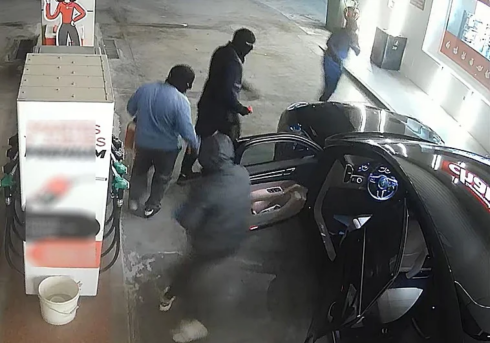THE victim of a grisly shooting that shook Marbella this weekend has been identified as a Swedish rapper with a violent past and suspected links to Stockholm’s organised crime.
Authorities revealed that 25-year-old Hamza Karimi, known by his stage name Hamko, had travelled to Spain on holiday after serving a five-year prison sentence for the attempted murder of a 14-year-old boy, whom he shot several times in the stomach.
Karimi was strolling through Puerto Banus on Friday afternoon when a man, later identified as a 38-year-old Afghan-Swede, gunned him down in a hail of bullets before fleeing the scene.
Disturbing CCTV footage captured a gravely wounded Karimi dragging himself toward a nearby café as he pleaded for help. He later died from his injuries in hospital.
Costa del Sol police’s Unit for Drugs and Organised Crime (Udyco) is leading the investigation into the murder.
Swedish newspapers have reported that the shooter, who was later arrested by Spanish police, may have acted on orders from south Stockholm crime group Dalen.
Karimi, once rumoured to be affiliated with Dalen, had allegedly defected to their rival gang Foxtrot – a move believed to have prompted the revenge killing.
In the hours following the shooting, several Dalen members reportedly posted Instagram stories featuring skull emojis and videos of celebratory fireworks, according to El Español.
In an eerie foreshadowing of his fate, Karimi had rapped in a track released only months earlier that “shots can burn but don’t panic if you’re shot.”
Gang violence also claimed the lives of two of Karimi’s closest friends, fellow Swedish underground rappers Mariaci and Einar.
Mariaci was shot dead in 2019 at the age of 19, while Einar was killed three years later in an execution-style attack at just 18.
The three artists appeared together in the 2019 music video for their hit track Nu Vi Skiner (‘Now We Shine’). Now they have all been murdered.
Swedish newspaper Svenska Dagbladet reported that the local ‘gangsta rap’ scene holds a dark secret – it is being used as a cash-laundering machine for organised crime.
According to the report, criminal gangs are funnelling illicit funds into Spotify, buying fake streams with cryptocurrency to artificially inflate play counts.
Spotify then pays out royalties on those plays, effectively turning dirty money into legitimate income.
Some artists connected to these schemes have even topped Spotify charts and won awards, Svenska Dagbladet reported, all while violent gang conflicts continued to rage on Sweden’s streets.
READ MORE: French murder fugitive chased on Costa Blanca motorway with vehicle towing stolen boat
Click here to read more Marbella News from The Olive Press.








